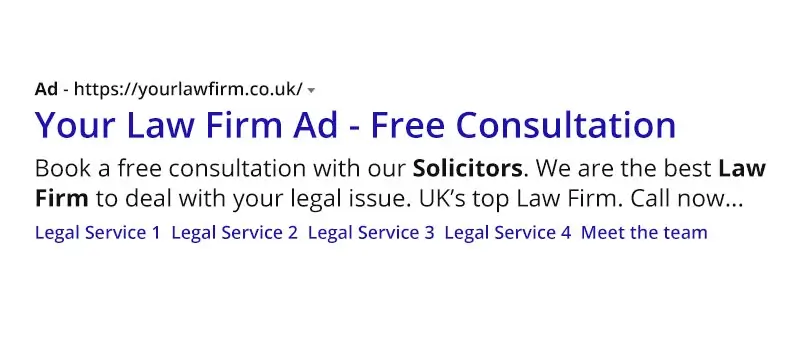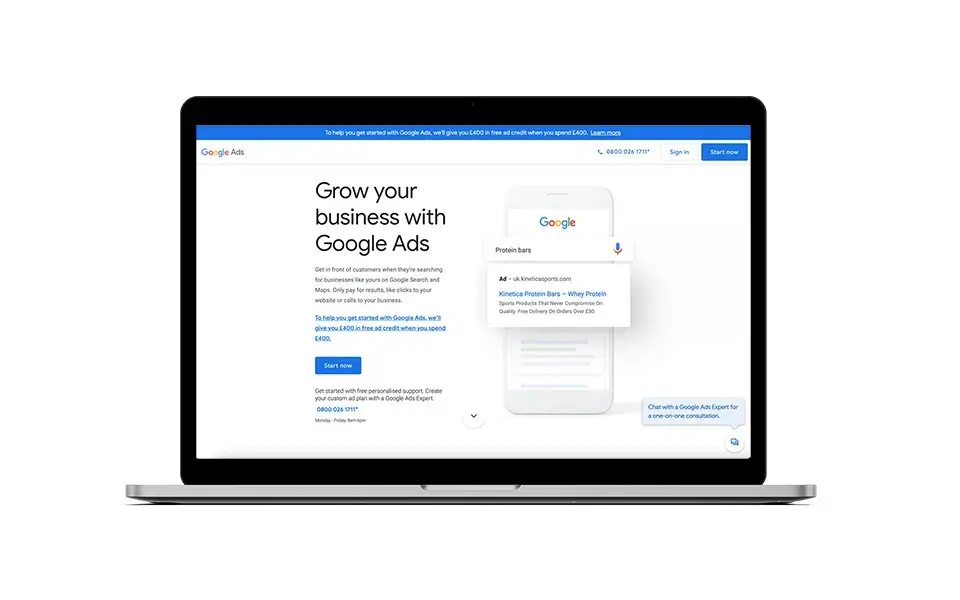Tips for law firms for running a great PPC campaign in 2025
People often turn to the internet when looking for a law firm or a solicitor to assist them with their legal issues.
Using an online search engine and visiting a law firm’s website are the most common search methods when it comes to looking for a solicitor.
Statistics show that as many as 2 million legal searches were made every day in 2014 in the UK alone. With increased 4G and 5G accessibility, it’s not difficult to imagine that this number is even higher today.
With so many people turning to online sources when searching for legal help and advice, using pay-per-click (PPC) advertising as part of your law firm marketing strategy can be a very effective way to reach prospective clients, generate new enquiries and ultimately grow your law firm.
Why is PPC a good way to advertise your law firm?
PPC is unique in the way that it lets you target very specific types of clients looking for specific legal services. Google collects huge amounts of information about its users, including their location, which in turn helps you target them improving your own client acquisition.
Depending on the type of campaign you want to run, PPC can start working for you in an instant or within a couple of weeks if it needs to learn your strategy.
It is important to keep in mind, however, that if you are inexperienced in PPC advertising, you can burn through a lot of money fast – and Google won’t refund it. So you may want to consider hiring an expert who understands how Google advertising works in order to help you get a good return on investment.
If you would like to discuss PPC for law firms with a specialist, reach out to us. Our team have over 15 years of experience in online / PPC advertising and can help you use Google as a resource to generate enquiries for your firm.
If you would like to start on your own, continue reading this blog to find out how to run a great PPC campaign for your law firm.

Create compelling ad copy
It takes one glimpse of a searcher to decide whether to click on a link or continue scrolling down to find a more appropriate link with a message that resonates with them the most.
Use your copy to capture your prospects’ attention, speak to their needs and persuade them to choose your services over your competitors.
Tell them what makes you better using ‘Calls to Action’ (CTAs) – action phrases such as ‘call now’ or book a ‘consultation’.
By crafting messages that focus on your prospects’ needs, they are more likely to respond and engage with your website.
It may take a few tries before you create the kind of copy that will work for your audience. However, if you avoid using vague, generic language, you are more likely to achieve your goal fast – that is getting prospects to your website to book a meeting.
Have you ever heard of A/B testing? You can set up a couple of different ad versions and let them run for a week to see which one performs best. Then reallocate your budget accordingly to get the best ROI.
Pay attention to your ad strength and use legal keywords
PPC advertising for solicitors differs from advertising other industries in many ways – apart from the ads and the ranking criteria.
You need to keep an eye on your ad score which is a metric that helps you ensure you are delivering the right messages to your searchers.
The score is based on your audience, relevance of your copy, and helpfulness. (Ultimately, Google also want to make sure that their clients see what they want to see and are happy with the level of service they deliver using their search service.)
The more relevant your advert copy is to the legal keywords you are bidding on, the higher the Quality score Google will give you. It is important to keep this high as Google uses the score to determine where to show your ad and also your cost per click.
Focus on your headlines
Your ad headlines are the absolute first thing searchers see. If your headlines don’t contain the right keywords and don’t deliver strong messaging, your ads will get ignored and won’t perform.
As space for your copy is limited, you need to ensure your headlines are crafted perfectly to generate clicks.
Create ad text that appeals to prospects across various devices
An eye-catching, compelling call to action phrase on one device tends to be equally compelling on other devices as well. Make sure they reflect your brand and the legal services you offer.
Try bidding on long-tail keywords
Long-tail keywords, unlike short-tail keywords such as ‘law firm’ or ‘personal injury solicitor’, tend to have less competition which makes them more affordable.
Find and bid on a mixture of keywords to reduce your acquisition costs.
Make use of Google’s Free Keywords Planner
Google’s own free keyword planner is a smart tool that exists to help you find new keywords. It allows you to analyse your own law firm’s website (or your competitor’s) to find relevant keywords, and by giving you new suggestions.
The main benefits of using the keyword planner include finding new, relevant keywords, seeing estimates of monthly search volumes, and determining your campaign budget.
A good keyword strategy will include a mixture of high and low-volume keywords which would include short and long-tail keywords. This will help you keep the spend more reasonable.
Enable various asset types to leverage your strategy
Using images, ratings and site links can help you make your ads more engaging while helping you meet your legal marketing objectives.
Assets, for example, site links can increase your clickthrough rate by as much as 20%.
If you’ve accrued over 100 reviews, Google may even allow you to display your rating under your ad copy. Having a 5-star rating within your PPC ad will certainly help you grab your prospects’ attention.

Target your geographical location
Targeting your specific geographical location may help you save money and persuade some prospective clients to make an enquiry. It may help you attract people living locally to reach out to your firm for help.
Whether you choose to target your own city or county, make sure you prevent serving ads abroad (unless of course you can assist someone living abroad). For example, if you are a personal injury solicitor working in England, you don’t want to be serving your ads to someone looking for help in the Netherlands.
As you know, if you are a law firm based in England, you may be able to help someone located in Wales but not in Scotland or Ireland. Make sure your ads don’t show in locations you don’t want them to show to limit your spending and make the most out of your budget.
This will especially help if you choose to bid on expensive keywords!
Use ad extensions – make connecting easier
Make connecting with your law firm easier by including ad extensions in your ads.
Ad extensions include call buttons, information about your location and links to specific pages on your website. They can help you generate more business if you target the right audience by making connecting with you and assessing your firm easier.
If your prospective client is searching for a divorce solicitor on their mobile or if they are on the go, they may choose to click on your phone number to get the information they are looking for. Having to access your website via a link, and then finding your contact page with your phone number may be taking too much effort for some.
On that note, make sure your law firm is advertising on mobile.
Make good use of Responsive Ads
Nowadays, mobile devices play a huge part in our lives. You may be reading this blog on your mobile phone right now!
As of 2023, more than 50% of all Google searches worldwide are done on mobile devices. To run a successful campaign, you need to make sure you tailor your advertisements for desktop and mobile devices.
Again, if you don’t feel confident enough to do this, don’t hesitate to reach out to our team. We can help you create captivating ads for all devices.
To get the most out of your Google Ad spend, Google themselves outline five mobile advertising strategies to help you capture clients on the go. Bear in mind that not all may be appropriate for your law firm, so you need to decide which ones are worth spending money on.

Use different keyword match types
Google Ads uses so-called keyword match types. These indicate where your ad shows up, depending on what gets searched.
On that note, general law- and solicitor-related search terms can be quite expensive! Therefore, using different keyword match types will help you cut the cost of your campaigns.
Broad match type
If you use broad-match keywords, your ad will show to a wider audience. You need to be careful with these as they can cost you more than other types. This is because close variations of your chosen keyword, related searches and other variations that Google will deem relevant will trigger it to show your ad to the searcher.
Exact match type
Exact match means Google will show your ads in results based on exact matches of your keywords or their close variations.
Phrase match type
Phrase match means Google will show your ads for matches of the phrase or its close variations with additional words before or after. For example, if ‘divorce solicitors in London’ is your keyword, your law firm may show up for searches that include ‘best divorce solicitor in London’ and ‘divorce solicitor in London reviews’.
Using different match types can result in two things:
- your relevancy may increase
- Your cost may reduce
You could use broad match keywords to display your ad to a wider audience or depending on your goals, an exact match to target specific types of prospective clients.
Use Negative Keywords
Negative keywords allow you to ‘block’ keywords you don’t want your ads to show for and filter out traffic that is irrelevant to your business.
Setting negative keywords is important as Google may want to try to push your ad to show synonyms that are irrelevant. For instance, if you use the word ‘lawyer’ in your ad, Google may want to try to substitute it with the word ‘attorney’ which is more likely to be used by US-based searchers.
Make use of negative keywords to reduce your PPC costs.
Don’t forget to optimise your law firm’s website
Law firm PPC campaigns can be effective at generating enquiries for your law firm. However, if your entire website doesn’t provide a good experience and information relevant to your prospective clients, you risk wasting money on clicks that won’t convert.
Spending money on PPC advertising only makes sense when you have a strategy in place with a clear goal – to convert visitors into new business.
To optimise your website for lead conversions (not just your lead page), you need to ensure the following:
– Copy is very clear and to the point
Google has a preference for websites that provide clear answers to users’ questions.
While you may be tempted to create copy that focuses on your brand, with long sentences and including legalese, this type of copy may not be appealing to your audience and create a poorer user experience (UX).
Also make sure your content is unique. Google is more than likely to nice content copied from other sources.
– Keywords from your PPC campaigns are used in the content
Create content that includes keywords that you are trying to target. Keep in mind quality is more important than quantity for Google so avoid stuffing keywords in each and every sentence on your pages.
Ensure your content is educational – see more about the recent helpful content update on Google’s blog.
– Visuals are relevant
Relevant images make the user experience better. Use imagery to engage your visitors and break up walls of text. There is nothing less encouraging than long paragraphs and a lack of variety.

Keep an eye on the data
In order to run a successful PPC campaign that will generate ROI, you need to keep a close eye on it and the data it generates.
Carrying out regular audits of your law firm’s PPC campaigns is extremely important in ensuring your ads are seen by the right people and that they are clicking and converting.
Set up correctly, Google’s analytics tools will tell you exactly which campaigns are successful, including which keywords generate the most clicks, which ones you are spending the least or the most, and so on. This data is important and very valuable and you can use it to help you make informed decisions about the next steps, where to improve and what needs changing.
Pay special attention to the following metrics:
Ad Quality Score
The Quality Score is a Google metric that dictates your ad rank and cost per click of your law firm’s ads. Google compares the relevance of your keywords to user searches and ensures they have a positive experience. The following factors determine your Quality Score:
- Click through rate,
- The keywords
- Ad’s relevance to the search query
- The quality of your landing page.
Click through rate
Click-through rate (CTR for short) is one of the more important factors determining your Quality Score. It reflects whether your ads are relevant to your users, or not. If users don’t click your ads because they find the ads irrelevant, you will see low CTR. This in turn tells you that you need to improve your keywords or ad copy, or both.
Conversion Rate
The conversion rate essentially tells you how many people who clicked on your advert ended up completing your call to action (call now, fill in our contact form, etc.) on your landing page.
This metric is just as important as the CTR. Ultimately, you don’t want to pay for ad clicks and traffic that doesn’t convert into enquiries.
Cost per each Conversion
As a law firm with a limited budget, one of your main goals will be to keep the cost of generating enquiries as low as possible. If you have to pay hundreds more to acquire new clients using PPC advertising, it will make it not worth it.
To prevent your ads from being too expensive, you will want to keep an eye on the cost per click, CPC.
If your budget is not unlimited, you really want to keep an eye on the CPC to ensure you don’t bid for keywords that are too expensive to prevent burning through your money.
If you notice clicks that cost a lot but are not converting, you are best to avoid them altogether by adding them to your list on negative keywords.
Budgeting for your law firm’s PPC campaign
At this point, you should have a broad understanding of how PPC works for law firms. However, you may be wondering how much a PPC campaign will cost you.
Unfortunately, there is no straightforward answer to this question. Unlike Claims Management Companies, Google doesn’t provide you with a set price per enquiry and you will have to qualify them yourself.
PPC campaigns respond and are influenced by Google algorithm changes and market trends. Together, they can impact your advertising spend and therefore cost per client acquisition.
You may find it challenging because you only pay when a searcher clicks on your ad and you can never know how often that will happen.
To help you put together a budget for your campaign, we have compiled some useful tips.
Set realistic goals
It is important to set realistic goals for your campaigns. Think about what outcome you are trying to achieve. Is it acquiring 10 new clients each month? Increasing your brand awareness?
Set a realistic goal, then think about whether your budget is enough to achieve it. Also, consider whether you have enough time to achieve your goals. If you are frequently busy, will you have time to check your Google data on a regular basis and make changes to your campaigns?
Develop your goals early on in your journey with PPC to inform your strategy and any future campaigns.
Use Google’s forecasting tools
Plan ahead of starting your PPC campaign for your law firm using Google’s forecasting tools.
The Google Keyword planner allows you to estimate traffic and costs and gives you an insight into metrics that will help you roughly forecast how much money to allocate to your campaign.
Get started with your law firm’s PPC campaign
If you have never invested in paid digital advertising for your law firm before, you may feel a bit nervous about starting your own PPC campaign.
If you need professional help, don’t hesitate to reach out to our friendly team. Our PPC experts have helped numerous law firms advertise online and can help yours too.
Call us now to speak to an expert or submit an enquiry using one of our contact forms or our live chat.
